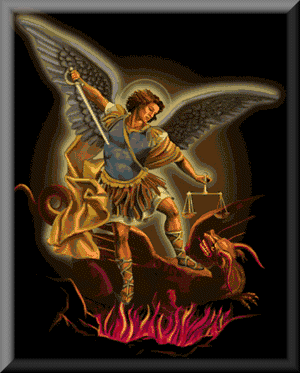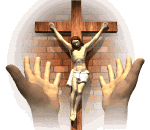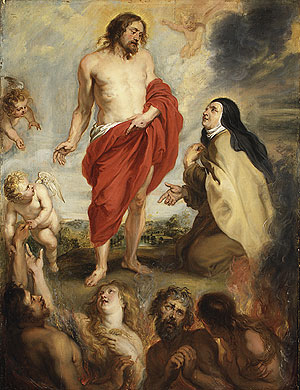V. Absolve, O Lord, the souls of the faithful departed from every bond of sin,
R. And by the help of Thy grace may they be enabled to escape the avenging judgment,
and to enjoy the happiness of eternal life.
V. Because in Thy mercy are deposited the souls that departed in an inferior degree of grace,
R. Lord, have mercy.
V. Because their present suffering is greatest in the knowledge of the pain that their separation from Thee is causing Thee,
R. Lord, have mercy.
V. Because of their present inability to add to Thy accidental glory,
R. Lord, have mercy.
V. Not for our consolation, O Lord; not for their release from purgative pain, O God;
but for Thy joy and the greater accidental honour of Thy throne, O Christ the King,
R. Lord, have mercy.
V. For the souls of our departed friends, relations and benefactors,
R. grant light and peace, O Lord.
V. For those of our family who have fallen asleep in Thy bosom, O Jesus,
R. grant light and peace, O Lord.
V. For those who have gone to prepare our place,
R. grant light and peace, O Lord.
V. (For those who were our brothers [or sisters] in Religion,)
R. grant light and peace, O Lord.
V. For priests who were our spiritual directors,
R. grant light and peace, O Lord.
V. For men or women who were our teachers in school,
R. grant light and peace, O Lord.
V. For those who were our employers (or employees),
R. grant light and peace, O Lord.
V. For those who were our associates in daily toil,
R. grant light and peace, O Lord.
V. For any soul whom we ever offended,
R. grant light and peace, O Lord.
V. For our enemies now departed,
R. grant light and peace, O Lord.
V. For those souls who have none to pray for them,
R. grant light and peace, O Lord.
V. For those forgotten by their friends and kin,
R. grant light and peace, O Lord.
V. For those now suffering the most,
R. grant light and peace, O Lord.
V. For those who have acquired the most merit,
R. grant light and peace, O Lord.
V. For the souls next to be released from Purgatory,
R. grant light and peace, O Lord.
V. For those who, while on earth, were most devoted to God the Holy Ghost, to Jesus in the Most Blessed Sacrament,
to the holy Mother of God,
R. grant light and peace, O Lord.
V. For all deceased popes and prelates,
R. grant light and peace, O Lord.
V. For all deceased priests, seminarians and religious,
R. grant light and peace, O Lord.
V. For all our brethren in the Faith everywhere,
R. grant light and peace, O Lord.
V. For all our separated brethren who deeply loved Thee, and would have come into Thy household had they known the truth,
R. grant light and peace, O Lord.
V. For those souls who need, or in life asked, our prayers,
R. grant light and peace, O Lord.
V. For those, closer to Thee than we are, whose prayers we need,
R. grant light and peace, O Lord.
V. That those may be happy with Thee forever, who on earth were true exemplars of the Catholic Faith,
R. grant them eternal rest, O Lord.
V. That those may be admitted to Thine unveiled Presence, who as far as we know never committed mortal sin,
R. grant them eternal rest, O Lord.
V. That those may be housed in glory, who lived always in recollection and prayer,
R. grant them eternal rest, O Lord.
V. That those may be given the celestial joy of beholding Thee, who lived lives of mortification and self-denial and penance,
R. grant them eternal rest, O Lord.
V. That those may be flooded with Thy love, who denied themselves even Thy favours of indulgence and who made the heroic act for the souls who had gone before them,
R. grant them eternal rest, O Lord.
V. That those may be drawn up to the Beatific Vision, who never put obstacles in the way of sanctifying grace and who ever drew closer in mystical union with Thee,
R. grant them eternal rest, O Lord.
V. Eternal rest give unto them, O Lord,
R. And let perpetual light shine upon them.
Let Us Pray
Be mindful, O Lord, of Thy servants and handmaids, N. and N., who are gone before us with the sign of faith and repose in the sleep of grace. To these, O Lord,
and to all who rest in Christ, grant, we beseech Thee, a place of refreshment, light and peace, through the same Christ Our Lord.
Amen
 The following is the longer version of the vital prayer composed by Pope Leo XIII in 1888 after his startling vision as to the future of the Church. This prayer was dedicated for the Feast of St. Michael 1448 years from the date of the election of the first Leo - Pope Saint Leo the Great. Everyone is familiar with the first prayer below which was mandated by His Holiness as part of the Leonine Prayers after Low Mass. Below are both the short and longer versions of this poignant prayer which should never be forgotten.
The following is the longer version of the vital prayer composed by Pope Leo XIII in 1888 after his startling vision as to the future of the Church. This prayer was dedicated for the Feast of St. Michael 1448 years from the date of the election of the first Leo - Pope Saint Leo the Great. Everyone is familiar with the first prayer below which was mandated by His Holiness as part of the Leonine Prayers after Low Mass. Below are both the short and longer versions of this poignant prayer which should never be forgotten. 
 Look down upon me, O good and gentle Jesus, while before Thy face I humbly kneel, and with burning soul pray and beseech Thee to fix deep in my heart lively sentiments of faith, hope and charity, true contrition for my sins, and a firm purpose of amendment; the while I contemplate with great love and tender pity Thy five most precious wounds, pondering over them within me, calling to mind the words which David Thy prophet said of Thee, my good Jesus: "They have pierced My hands and My feet; they have numbered all My bones."
Look down upon me, O good and gentle Jesus, while before Thy face I humbly kneel, and with burning soul pray and beseech Thee to fix deep in my heart lively sentiments of faith, hope and charity, true contrition for my sins, and a firm purpose of amendment; the while I contemplate with great love and tender pity Thy five most precious wounds, pondering over them within me, calling to mind the words which David Thy prophet said of Thee, my good Jesus: "They have pierced My hands and My feet; they have numbered all My bones." 





